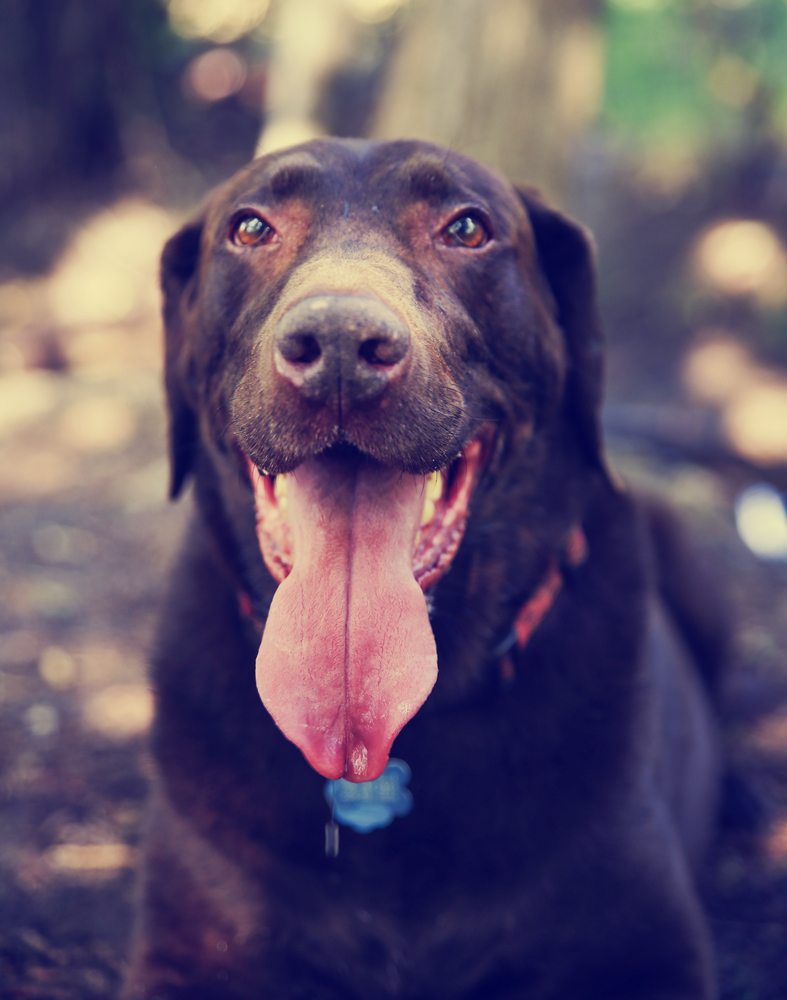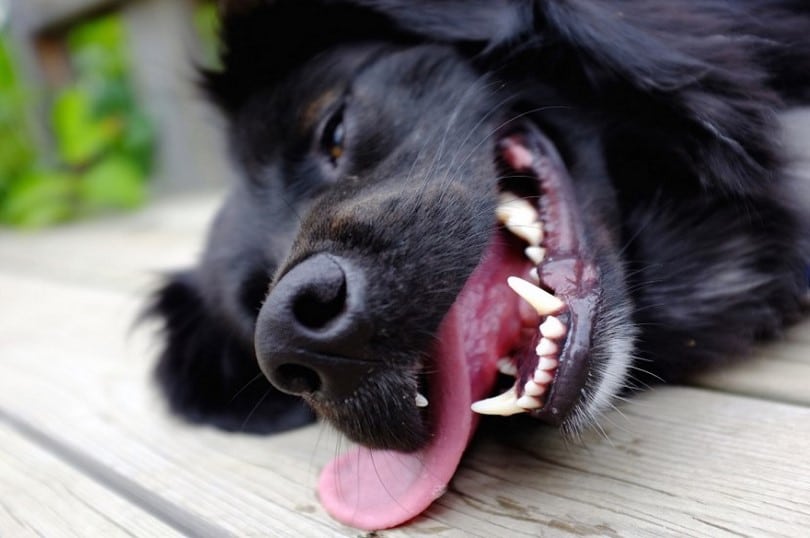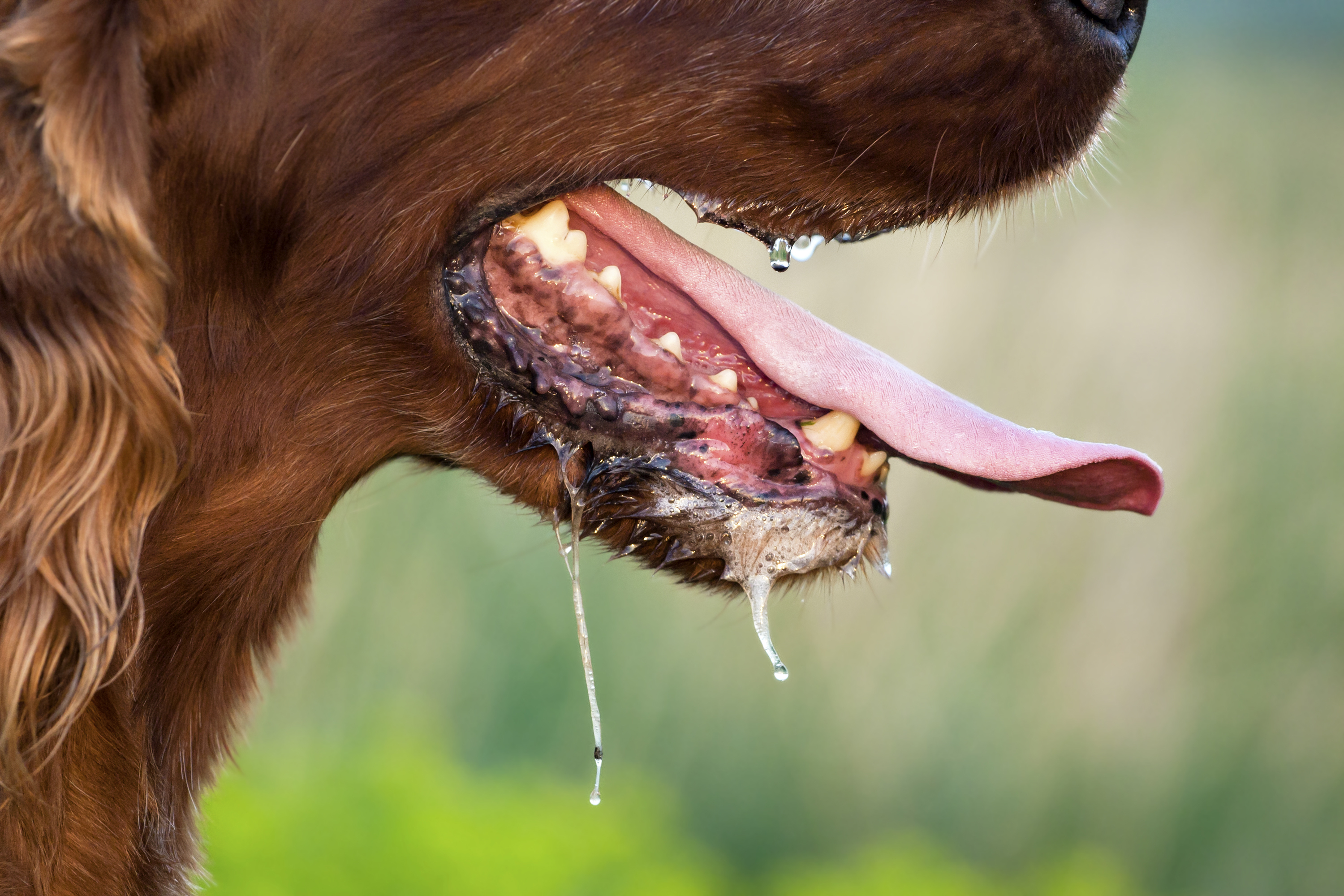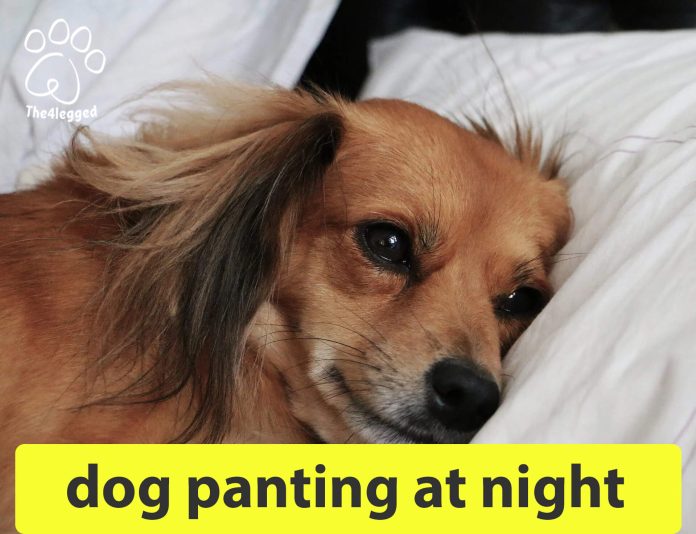Have you come across your dog panting at night several times? Dogs pant for many purposes. Most of us find it quite normal for all of them. But sometimes we can’t help but ask ourselves what their panting is for or why they do such things especially in the middle of the night. Could there be a connection? Could it be something to do with the dark? Or could there be something wrong with them?
As a loving dog owner, I have always had my worries with my dogs. It took a while to research and learn what I needed to know about why my dog is panting at night. Now you can grab this opportunity to learn what you need to know as well!
Let’s start…
Why do dogs pant?

Have you ever asked yourself if dogs sweat like we do? Did you ever wonder what the answer was? Well, the answer is… yes and no. Yes, because they definitely sweat. No, because they don’t sweat like humans do. Unlike us, dogs are not able to produce any sweat through their own skin in order to cool themselves. But it is possible for them to sweat through their paw pads.
Now, how is this connected to their panting? You may ask. Well, the fun fact here is that dogs cool themselves through panting. That’s right! They pant in exchange for no body sweat. It gives them the opportunity to breathe in the air that their bodies need in order to have a successful cooldown.
Dog panting at night
Should I be worried that my Dog is panting at Night?
Most of us have known dogs panting to be incredibly normal for their species. But we never look through the details on their ways of panting. You may hear them pant after a long walk, after a game with them, or when they just settle down after an exhausting day. But doesn’t it get you thinking if they are having troubles or not? Well, we are going to find out!
Today, you’re going to learn the difference between a dog’s normal panting and abnormal panting.
When does normal and abnormal panting occur in our dogs?
Non-dangerous when your dog panting
When it comes to normal panting, dogs do this in order to cool down. This happens when your dog’s temperature increases. If your dog is panting after a few minutes of exercising or playing with you. It is considered a healthy method for them to prevent dehydration or heatstroke.

Dangerous when your dog panting
If you are talking about abnormal panting, this is something to look out for. It could mean that your dog is suffering an illness or many critical cases. To spot an abnormal way of panting, see if your dog has any of these factors:
- Your dog’s panting is much excessive than the usual panting
- Your dog is panting when they are not that warm and doesn’t need to cool down at all
- Your dog’s panting sounds more harsh and louder unlike a normal pant
- Your dog is putting more effort than usual as they keep panting
What are the Causes for Abnormal Panting?
There are many reasons or causes to why your dog is forced to pant abnormally. The level of severity can be mild to critical. This all depends on your dog’s lifestyle or family bloodline. If ever you find your dog panting abnormally, I recommend you give them a visit to the vet to ensure your dog’s health. Here are 5 possible causes for abnormal panting:
-
Overheating

We may think that when a dog’s body overheats, or their body temperature rises, all of it can be fixed quickly just through panting. But no, there is such thing as overheating which is deadly as it can lead your dog to have heatstroke. Other symptoms include glazed eyes, a great need to drink water, increased pulse rate and heartbeat.
-
Pain
It could be possible that your dog is not feeling alright or that something must have happened that may have led them to a painful condition. It can be difficult to tell what kind of pain they are feeling knowing that your dog can’t tell you at all. It is best if you have him or her visit the vet for just in case purposes.
-
Body Disorders or Diseases
When we say body disorders, your pet could possibly be having either cardiovascular disorders, respiratory disorders, hematologic disorders, miscellaneous disorders, or neurologic disorders. Consult the vet immediately if ever you think this is possible.
Excessive panting in dogs at night can be attributed to various metabolic disorders, such as diabetes and Cushing’s Disease. Cushing’s Disease, in particular, is known to cause persistent panting regardless of the time of day. This condition is typically triggered by a tumor on either the pituitary or adrenal gland, leading to an overproduction of adrenocorticotropic hormone (ACTH) and an increase in cortisol levels, also known as the stress hormone.
Aside from excessive panting, dogs with Cushing’s disease may exhibit other symptoms, including heightened appetite and thirst, increased urination, lethargy, hair loss, skin infections, and abdomen enlargement. The panting experienced by dogs with Cushing’s disease can be a result of stress caused by their overall discomfort.
If you observe your dog excessively panting at night, it is highly recommended to schedule a veterinary ASAP.
-
Anemia
This is a state where your dog has low levels of red blood cells or does not have enough hemoglobin. They are responsible for carrying the oxygen around the body. If your dog is abnormally panting, it could be that they lack oxygen. Other symptoms include weakness, lethargy, failing exercises, increased heart rate, and loss of appetite, rapid breathing and collapsing.
-
Animal Stress or Fear
When your dog is not panting normally, it could probably just mean he or she is experiencing animal stress. Either they are anxious, stressed, or experiencing specific phobias. We usually use the term “behavioral panting” when it comes to this. If you think your dog is having animal stress, see whether your dog is also yawning often, pacing, and crying, frequent licking, trembling and hiding.
Some dog breeds prone to panting at night

Genetics can play a significant role in contributing to breathing difficulties in certain dog breeds. For instance, breeds with short heads often experience brachycephalic syndrome, a condition that makes them susceptible to obstructive breathing due to the specific shape of their head, muzzle, and throat.4
There are several breeds commonly associated with breathing problems, including:
- Bulldogs (English Bulldogs, FrenchBulldogs)
- Pugs
- Boston Terriers
- Boxers
- Shih Tzus
- Cavalier King Charles Spaniels
- Pekingese
- Brussels Griffons
- Lhasa Apsos
- English Toy Spaniels
When should I worry about my dog panting?
Warning Signs Of Canine Respiratory Issues: When To Seek Veterinary Care
While panting is a normal behavior for dogs, excessive or abnormal panting can sometimes indicate respiratory issues that require veterinary attention. If you notice any of the following warning signs, it is important to seek immediate veterinary care for your furry companion.
1. Persistent or Labored Panting: If your dog is panting heavily for an extended period, especially if accompanied by difficulty breathing or wheezing, it could be a sign of respiratory distress.
2. Rapid Breathing: Dogs normally take around 10-30 breaths per minute; however, rapid or shallow breathing may indicate an underlying respiratory problem.
3. Bluish Gums or Tongue: Cyanosis, characterized by a bluish discoloration of the gums and tongue, suggests inadequate oxygenation and requires immediate medical attention.
4. Coughing or Gagging: Frequent coughing or gagging can be indicative of respiratory infections, allergies, heart disease, or other conditions affecting the airways.
5. Nasal Discharge: Unusual nasal discharge that is thick, colored (yellow or green), foul-smelling, or bloody may suggest an infection or other respiratory issue.
Senior dog panting at night
Understanding The Restlessness Of Aging Dogs
Why Does Old Dog Panting And Pacing At Night?
As our furry companions enter their senior years, we may notice changes in their behavior, particularly during nighttime. One common concern is the restlessness exhibited by aging dogs, characterized by panting and pacing.
This behavior can be attributed to several factors related to the natural aging process. Here are some possible reasons for a senior dog panting at night:
Pain or discomfort: Older dogs may develop age-related conditions such as arthritis or joint pain, which can cause restlessness and panting, especially when trying to find a comfortable sleeping position.
Respiratory issues: Senior dogs may be more prone to respiratory problems such as chronic bronchitis or collapsing trachea. These conditions can lead to panting, coughing, and difficulty breathing, particularly during the night when the dog is lying down.
Heart disease: Older dogs can develop heart conditions, such as congestive heart failure, which can result in breathing difficulties and panting, especially when the heart has to work harder during periods of rest.
Read more: Understanding dog congestive heart failure when to put down
Anxiety or cognitive decline: Senior dogs may experience increased anxiety or cognitive decline, leading to nighttime restlessness and panting.
Metabolic disorders: Conditions like Cushing’s disease or hypothyroidism, which are more common in senior dogs, can cause increased panting and other symptoms.
Additionally, Aging dogs may suffer from canine cognitive dysfunction syndrome (CDS), a condition similar to Alzheimer’s disease in humans.
CDS often disrupts sleep patterns and causes confusion, leading them to pace anxiously during the night.
What about puppy panting at night?
Puppy panting at night can be a cause of concern for many pet owners. let’s crucial to identify the common triggers that may be keeping your furry friend awake during the night.
Uncomfortable sleeping environment:
Puppies are sensitive to temperature changes, so if their sleeping area is too hot or cold, they may start panting to regulate their body temperature.
Anxiety or stress:
Puppies, especially when transitioning to a new environment or experiencing changes in routine, may feel anxious or stressed. Panting can be a response to these emotions.
Respiratory or medical conditions:
In some cases, panting at night in puppies may be associated with respiratory issues or underlying medical conditions. These can include infections, allergies, or congenital abnormalities.
If the panting is persistent, accompanied by other concerning symptoms, or if you notice any difficulty breathing, it’s best to seek veterinary advice.
How to calm dog panting at night?
To reduce dog panting during the night, there are several effective measures that can be taken.
Ensuring a comfortable sleeping environment: Keep the room well-ventilated and at a cool temperature to prevent overheating. Providing a comfortable bed or mat for your dog to sleep on can also help alleviate panting.
Make sure your dog has access to fresh water throughout the day and especially before bedtime. This will help prevent dehydration, which can lead to excessive panting.
Establishing Healthy Habits: Regular exercise during the day is essential in order to tire out your dog before bedtime. This will not only promote better sleep but also reduce their overall energy levels, resulting in less panting at night.
Create a calm and peaceful atmosphere by minimizing loud noises or disturbances in the evening.
Q&A
Dog panting at night and drinking lots of water?
Excessive panting and increased thirst can be signs of various health conditions, including metabolic disorders, kidney issues, diabetes, or hormonal imbalances. A veterinarian can perform diagnostic tests and provide an accurate diagnosis.
Why is my 13 year old dog panting so much?
13 years old is the old age of a common dog. If your dog is panting more than usual, consider making an appointment with your veterinarian to find out the specific cause. Before doing that, you can track down the causes of an old dog panting in our above content for reference.
Why is my dog panting while resting?
If your dog is panting while at rest, it may indicate an underlying health issue such as respiratory problems, heart conditions, or obesity. However, it’s important to consider that panting can also be a natural response to a warm environment. Dogs use panting as a mechanism to regulate their body temperature when they feel overheated.
Conclusion
At times like this, please do not panic! All you have to do is observe and apply whatever it is that you have learned in this article. Symptoms of each cause can help you identify what your dog might be facing. But to be extra sure of things, it is highly recommended to check in with your dog’s vet.
I hope this article helped! Please share this with friends and family to help those who are unsure about their dog’s panting. Thank you!


You can also use cotton balls to rub rubbing alcohol on your dogs paws to cool them off